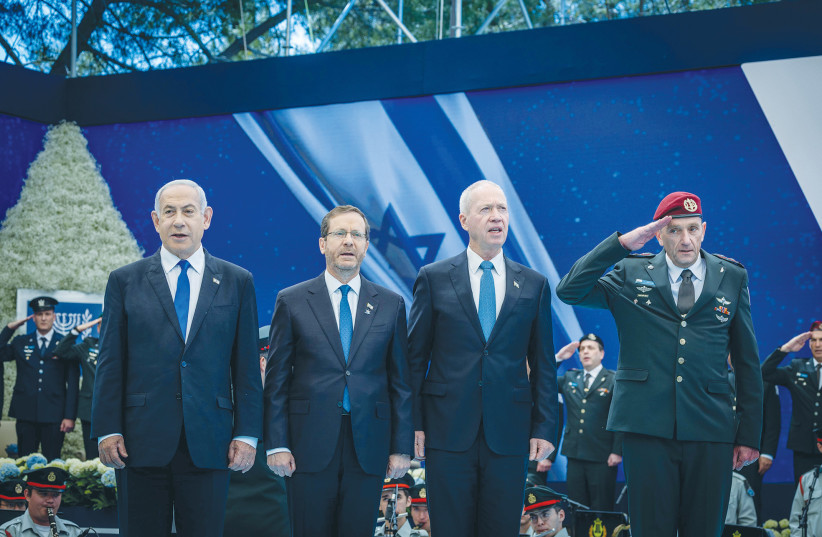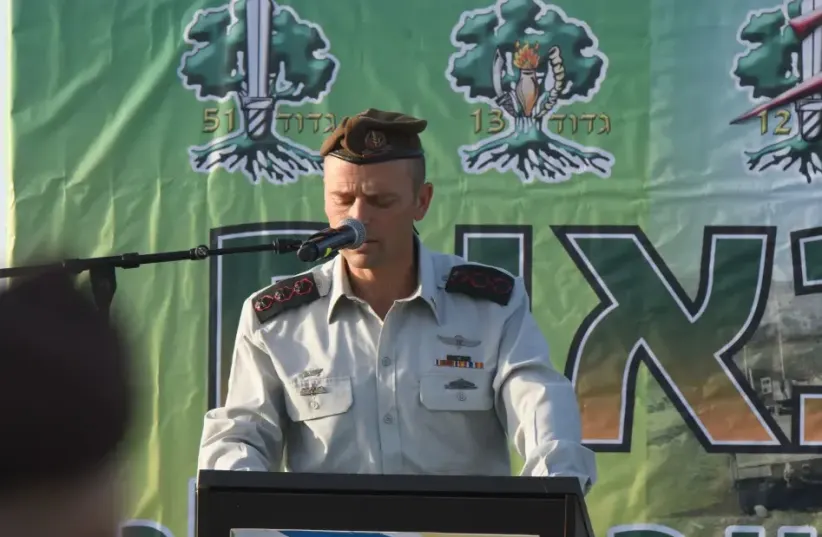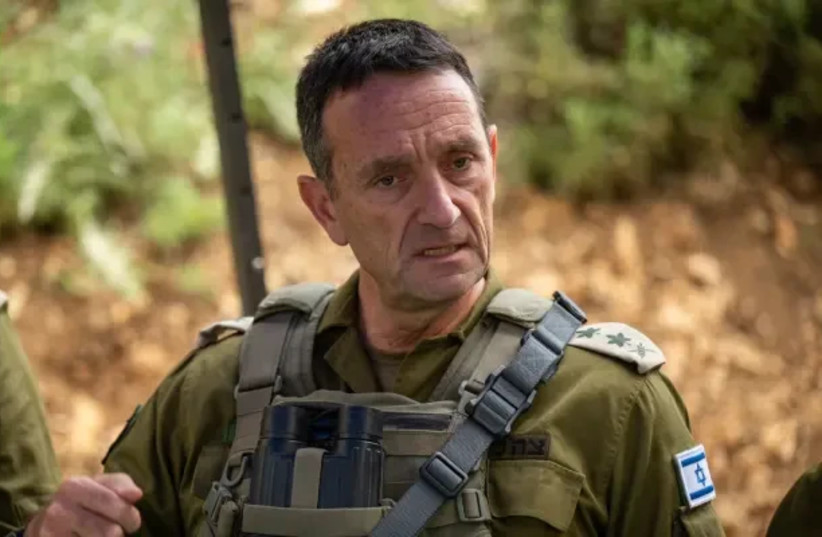Last Thursday, IDF Chief of Staff Lt.-Gen. Herzi Halevi was engulfed in controversy when he appointed Brig.-Gen. Shlomi Binder to replace Maj.-Gen. Aharon Haliva as the next chief of military intelligence.
The controversy has multiple fronts, but the irony is that nearly none have to do with Binder himself. Certainly, until October 7, Binder was viewed as one of the top officers in the army, possibly a future IDF chief. The initial dilemmas actually have to do more with Halevi.
Dilemma have to do with Halevi, not Binder
Many political and military officials believe he should have already resigned since October 7 took place under his watch. He himself has made it clear that he intends to resign.
Initially, he and other defense chiefs delayed their resignation, arguing that carrying out the war against Hamas would be more efficient and quicker under their watch, rather than a whole new slew of staff, that time was of the essence.
Halevi will also be issuing his own report on what led to the October 7 failure, likely by around mid-June.
If Prime Minister Benjamin Netanyahu had given any indication that he would resign as well, Halevi might already have resigned already, or perhaps immediately after the June report.
A significant reason for the delay, including after Haliva’s announced resignation on April 22, is their steadily-dwindling trust of Netanyahu.
Haliva, along with Defense Minister Yoav Gallant, believe that Netanyahu’s primary aim is to dump responsibility for the October 7 disaster on the IDF, while trying to avoid personal blame, so as to extend his political career.
IDF believe PM blaming them for October 7
They also believe that Netanyahu will try to ensure that whoever is chief next will cooperate with this strategy to some degree or another, including with appointments to high command.
For example, the next chief selected by Netanyahu could select an intelligence chief who places all responsibility for October 7 on Halevi and Haliva.
One lead candidate – if Netanyahu makes the selection – would be former major general and current Defense Ministry Director-General Eyal Zamir.
Netanyahu helped build Zamir up into an IDF juggernaut, partially due to their closeness when Zamir served as his personal military secretary.
This was why Netanyahu wanted Zamir, not Halevi, as IDF chief in early 2023, but Gantz circumvented that by appointing Halevi just before Netanyahu’s return to power.
Halevi has been outright from the start of his readiness to take personal responsibility for portions of the October 7 failure and to place portions of the blame on Haliva.
But he also deeply believes that Netanyahu shares much of the blame, given that he was prime minister from 2009-2024, absent 18 months, but including the year leading up to and including October 7 and most many of the years Hamas was in power in Gaza.
Halevi, Gallant, and others in the defense establishment hold Netanyahu accountable for specifics:
- Forcing the IDF into a strategy of accepting and containing Hamas;
- Refusing requests to assassinate Gaza chief Yahya Sinwar, October 7 mastermind;
- Provoking the judicial overhaul controversy, which weakened the IDF, both in real terms and in Hamas and Hezbollah’s perceptions of it, enough to increase the motivation to strike.

Halevi also knows that National Unity party leader and Minister-without-portfolio Benny Gantz may try to force new elections sometime between June and December. He then may delay his own resignation to give a selection of his own replacement to whoever wins.
For his part, Netanyahu is trying to stave elections off – current polls say he would lose to Gantz – long enough for the political climate to change and for him to extend his career.
Therefore, a rising number of public figures and even within the apolitical IDF think Halevi must not delay his resignation much further. They understand his concerns with Netanyahu but believe that, seven months later, the IDF must move on beyond the cloud of October 7, impossible as long as he stays on.
Moreover, they believe that the cloud of October 7 is hanging over him in terms of whether he can properly assess threats, so he should not be selecting any new IDF high command posts – especially not the intelligence chief.
So now the controversy arrives at Binder himself. Binder has a sterling record; he was in the elite Sayeret Matkal special forces, and was a former commander of the Golani Brigade – often a benchmark for future IDF chiefs, as it is viewed as the military’s most crucial large-scale force.
Binder also never served in top posts in IDF intelligence or in the IDF Southern Command, the two viewed as most blameworthy for October 7. However, as the number two officer in IDF Operations Command on October 7, some think that he must shoulder similar responsibility to other related commands for October 7.
For example, when he was given updates about potential dangers on the evening of October 6, he could have tried to convince Halevi to send significant reinforcements to the border.
This issue is so serious that families of hostages have said they will file a petition with the High Court of Justice to block his appointment. It is unlikely that the court would intervene on such an issue, but this shows the level of controversy involved.
Here, the facts get hairy.
In addition, leaks from Binder supporters claimed that though he was given a general update on October 6, he was in the dark about significant details. They say that IDF intelligence never passed on to him that they had in hand a potential Hamas plan for an invasion.
Further, they say that the IDF Southern Command did not pass on to him all of the concerns of its lower-ranked border lookouts regarding increased movement near the border. They further say that he neither knew that the Shin Bet was sending dozens of reinforcements to the border, “the Tequila Unit,” nor that the Nova music festival was taking place.
Adding together all of what he did not know, Binder could plausibly argue that he cannot be held responsible: Even if there was a basis to send major reinforcements based on the data, he didn’t have the full picture needed to do that.
But isn’t the role of top officers – like the number two in IDF Operations Command – to be proactive in making sure they get all the crucial data needed to keep the country safe? Can Binder really get a pass because some lower officers did not tell him what he should have been told and known?
Or is his lack of getting such crucial information a sign that he lacked and lacks the proactive character that could have stopped October 7 and could have stopped future surprise attacks?
Yossi Ben Ari, a former Brig.-Gen. and senior intelligence official, as well as the current head of the Intelligence Heritage and Commemoration Center’s journal, argued that Binder’s “advantage” of being a former Golani chief and being so grounded in operations, is actually a disadvantage.
Ben Ari claimed that the last five IDF intelligence chiefs have been cut from a similar operations cloth and that all of them lacked the humility and readiness to truly engage in playing out alternate scenarios that aren’t the most likely ones.
He added that only former Maj.-Gen. Aharon Zeevi Farkash, who was intelligence chief until 2006, was genuinely ready to take long-shot threat scenarios seriously, and to invest in defending against them.
Ben Ari stated that after October 7, it is more crucial than ever that a different kind of officer, with greater prior experience in intelligence, and less focused on intelligence for mere tactical gains the way a career operations officer would be, should be the next military intelligence chief. Ben Ari and others noted as well that Binder is leapfrogging to the IDF intelligence chief post.
In contrast, typically the intelligence chief has already served in one or more posts as a major general before achieving what many view as the second most important post in the military, especially since the IDF intelligence chief often gives his own direct advice to the prime minister and the cabinet.
These rank issues, which could appear esoteric, are actually quite substantive. There are usually only 10-20 major generals in the entire army making up the IDF high command, and even there, some posts are more important than others.
Chiefs of intelligence, northern command, and southern command, for example, are much more important than human resources, logistics, and the navy. Running those is generally viewed as something that should be done only by an officer who has already experienced running a whole command.
So then why did Halevi pick Binder, especially given there were other qualified candidates with less controversy? Ben Ari offered former major generals who would fit the bill: Yossi Baidatz, Nitzan Allon (currently running the IDF hostage recovery efforts), Lior Carmeli, and Zohar Palti (who also served in the Mossad and the Defense Ministry.)
Some argue that it relates to the two having served closely together in Sayeret Matkal, a factor that can bend in either direction.
Whatever the reason, it seems that Halevi did not fully anticipate the pushback he received, but he also has given no sign that he will back down.
While other right-wing political officials have attacked the two, Netanyahu has so far kept silent, likely because any criticism he makes of Halevi these days could lead to a counter-onslaught calling on him to resign.
Whether Binder can overcome this rough start and place IDF intelligence back in the right direction to avoid future October 7-style surprises will be crucial to the countries’ future.

